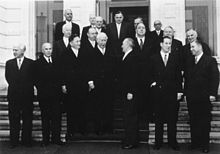Waldemar Kraft
Waldemar Erich Kraft (born February 19, 1898 in the town of Brnahmow in the town and country community of Jaratschewo , Jarotschin district , Posen province ; † July 12, 1977 in Bonn ) was a German politician ( GB / BHE , CDU from 1956 ).
education and profession
After force of the Protestant faith, was to Obersekunda the secondary school had visited in Poznan, he then completed an agricultural apprenticeship. From 1915 to 1920 he was a soldier and took part in the First World War, where he was seriously wounded. Most recently he was employed as a company commander. From 1921 to 1939 he was director of the “Main Association of German Farmers' Associations” in Poznan, and from 1925 he was also director of the “German Central Agricultural Association in Poland ”. From 1939 to 1940 he was President of the Poznan Chamber of Agriculture . From 1940 to 1945 he was the managing director of the "Reichsgesellschaft für Landbewirtschaftung in dereinegegelte Ostgebieten mbH" ("Reichsland") in Berlin , which was relocated to Ratzeburg shortly before the end of the war . From 1945 to 1947 he was interned in Schleswig-Holstein and lived as an unemployed person in Ratzeburg until 1950 .
From 1949 to 1951 he was spokesman for the Weichsel-Warthe country team and signed the charter of German expellees . He later became honorary chairman.
Political party
Kraft was a member of the NSDAP . On November 13, 1939, he was also appointed Honorary Hauptsturmführer of the general SS .
In 1950 he was one of the founders of the Federation of Expellees and Disenfranchised (BHE), of which he was state chairman in Schleswig-Holstein from 1950 to 1951. In 1951 he was elected federal chairman of the BHE, which from November 14, 1952 was called the All-German Block / BHE (GB / BHE). After the scandal at the federal party congress on September 8 and 9, 1954, about the failure to re-elect the press officer Eva Countess Finck von Finckenstein , Kraft did not accept his subsequent re-election as federal chairman (90 of 131 votes).
On July 11, 1955, he resigned from the GB / BHE with the so-called "KO group" (named after him and Theodor Oberländer ) and on March 20, 1956, he joined the CDU.
MP
From 1950 to 1953 Kraft was a member of the state parliament of Schleswig-Holstein, where he represented the constituency of Lauenburg- West.
From 1953 to 1961 he was then a member of the German Bundestag , first elected for the GB / BHE, he joined the CDU / CSU parliamentary group on July 15, 1955 . Here he was from 1960 to 1961 chairman of the committee for the equalization of burdens .
Waldemar Kraft was last drafted into the German Bundestag (3rd electoral term 1957) via the state list of North Rhine-Westphalia .
Public offices
From September 5, 1950 to June 25, 1951, Kraft was Minister of Finance and Deputy Prime Minister of Schleswig-Holstein in the state government led by Prime Minister Walter Bartram . From June 28, 1951, he held the same position in the state government headed by Friedrich-Wilhelm Lübke , and from October 8, 1951, he was also the executive minister of justice.
After the federal election in 1953 , he resigned from the state government on October 20, 1953 and was appointed Federal Minister for Special Tasks in the Federal Government led by Federal Chancellor Konrad Adenauer on the same day . On October 16, 1956, he resigned from the federal government.
Honors
- 1956: Grand Cross of the Order of Merit of the Federal Republic of Germany
literature
- Rainer Salzmann: Kraft, Waldemar. In: New German Biography (NDB). Volume 12, Duncker & Humblot, Berlin 1980, ISBN 3-428-00193-1 , p. 655 f. ( Digitized version ).
Web links
- Waldemar Kraft in the Schleswig-Holstein state parliament information system
- Waldemar Kraft in the Munzinger archive ( beginning of article freely accessible)
Individual evidence
- ↑ Kraft, Waldemar . In: Martin Schumacher (Ed.): MdB - The People's Representation 1946–1972. - [Kaaserer to Kynast] (= KGParl online publications ). Commission for the History of Parliamentarism and Political Parties e. V., Berlin 2006, ISBN 978-3-00-020703-7 , pp. 665 , urn : nbn: de: 101: 1-2014070812574 ( kgparl.de [PDF; 508 kB ; accessed on June 19, 2017]).
- ^ German Bundestag, 17. Election period, 204th session on November 8, 2012, PDF document 17/8134 Dealing with the Nazi past
| personal data | |
|---|---|
| SURNAME | Kraft, Waldemar |
| ALTERNATIVE NAMES | Kraft, Waldemar Erich (full name) |
| BRIEF DESCRIPTION | German politician (GB / BHE, CDU), MdL, MdB |
| DATE OF BIRTH | February 19, 1898 |
| PLACE OF BIRTH | Brbestow , Poznan Province |
| DATE OF DEATH | July 12, 1977 |
| Place of death | Bonn |
